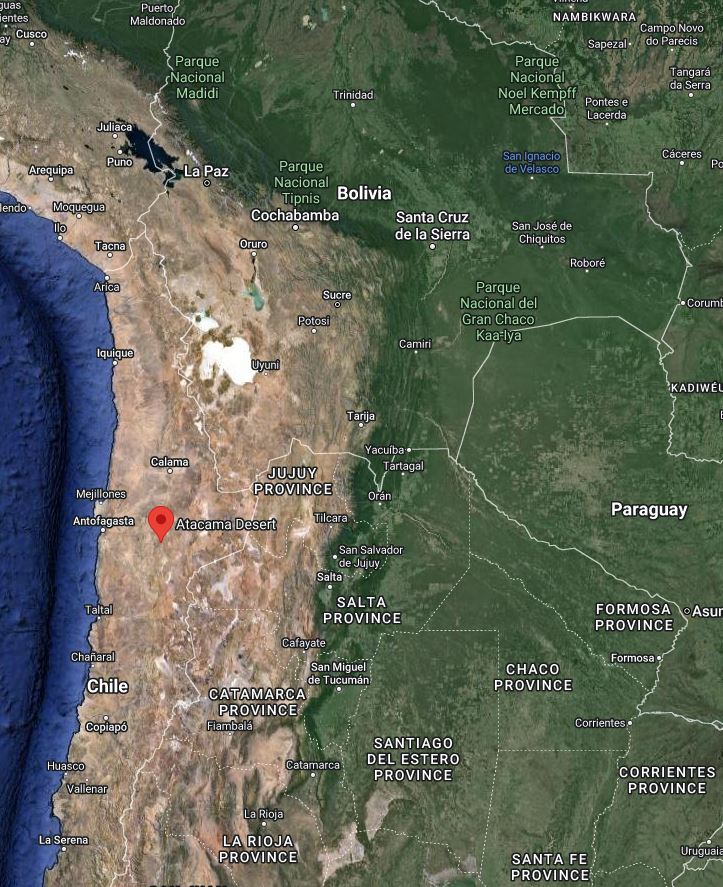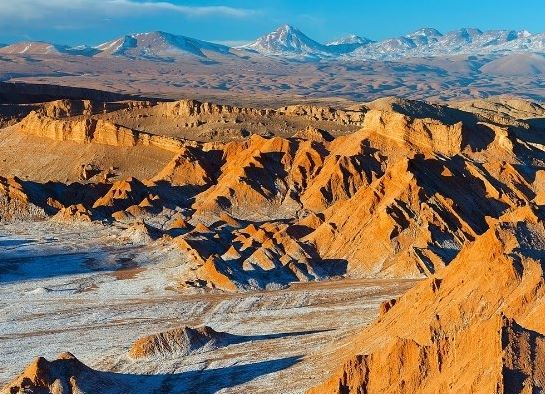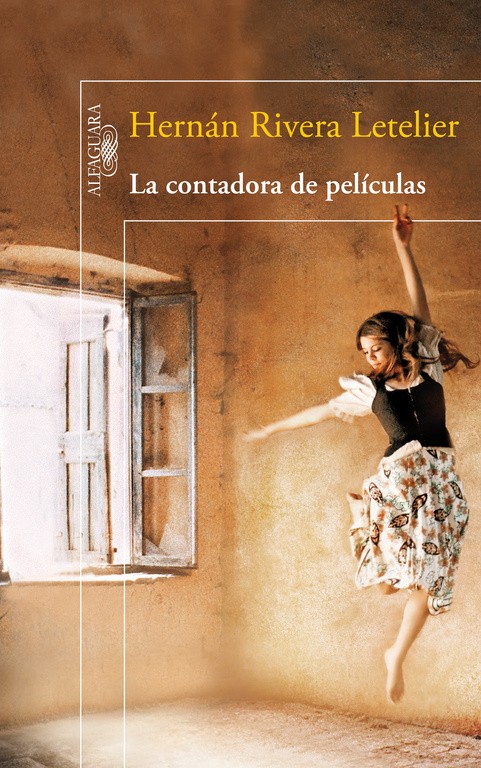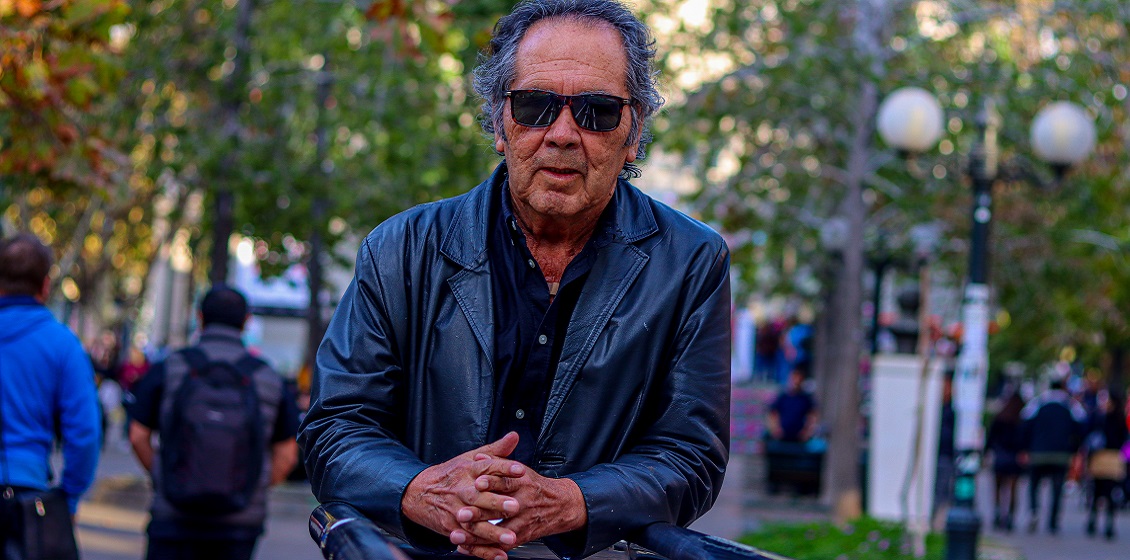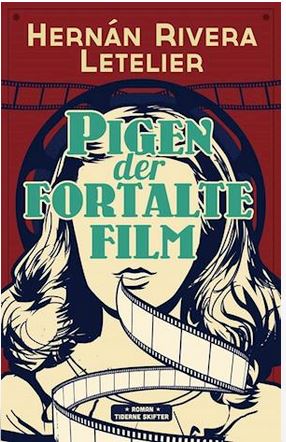The Atacama desert is the main character of all the stories, poems, and novels written by Hernan Rivera Letelier (b. 1950), a Chilean writer who has been internationally acclaimed for his 22 novels, which have been translated into 23 languages. One of his most cherished stories is about María Margarita, a girl who lives in a small, lost, and impoverished town in the Atacama Desert in the North of Chile, in the late sixties. Her telling of movies to her family and neighbors was a talent but also a curse.
This story was embodied in a novel called The Movie Teller. On November 3rd, 2023, a movie based on the same book – directed by the Danish filmmaker Lone Scherfig – was released internationally [Premiere in Denmark: 2 May 2024].
The movie was filmed between March and May of 2022, in the North of Chile; a region that’s home to a big part of Chilean history. The Atacama desert is the landscape where miners used to extract nitrate or “Chilean Saltpeter”, the main mineral of Chilean export during the 19th and 20th century. Saltpeter was used as fertilizer and other chemical uses such as gunpowder and fireworks.
The exportation of nitrates to Europe and the USA have shaped the economy, culture, and history of this region of Chile, and Hernan Rivera Letelier is praised as a writer for depicting the stories, landscape, and people of this region. Although Rivera Letelier was born in the South of Chile, he lived as a child and has worked as an adult in the saltpeter mines in Antofagasta, in the North of Chile. His literary work has been devoted to – in his own words – “fill the desert with words”. In 2022, he won the “National Literary Prize” of the Chilean government for his work, and he is very cherished by his readers.
The Movie Teller is a result of an international collaboration, not only in the production and directing, but the cast is also composed by respected, international actors such as Bérénice Bejo (The Artist), Antonio de la Torre (The Kingdom), and the Spanish-German actor Daniel Brühl (Inglourious Basterds, Goodbye Lenin). The Chilean cast includes both young actors (Alondra Valenzuela, Sara Becker) and veteran actors (Mario Horton, Pablo Schwartz, Luis Dubo, etc.) who are loved by the Chilean public.
“We were all amazed by the fact that a Danish filmmaker wanted to come to the desert to direct the film. She was very enthusiastic about the story”, recalls Hernan Rivera Letelier while seated in a hotel lobby in Santiago, Chile. He still lives in the city of Antofagasta, where he writes all his stories, but in June of 2023 he came to Santiago to do a conference and book signing of his latest novel, Hombres que llegan a un pueblo (or Men Come to a Town in the English translation). Rivera Letelier has always been a warm, witty and adventurous man, although now, at 73 years old, he has Parkinson’s disease, which makes him move and speak slowly.
Why do you think Lone Scherfig, a Danish filmmaker, was interested in directing this movie and telling this story?
“I think it is a universal topic. Being a girl, the love for movies is a universal experience. This is why people like this story so much.”
How many days did it take to write The Movie Teller?
“La Reina Isabel cantaba rancheras (Queen Elizabeth Sang Mexican Folk Song), my first book [and the one that made him famous, ed.] took me four days of writing. The novel The Movie Teller came out in three months and I didn’t correct anything because it came out perfectly. It was a Eureka moment that I experienced.”
Fifteen years ago, in 2008, Hernan Rivera Letelier was writing his tenth book, The Art of the Resurrection, when – like everything in his life, he tells – by chance or destiny, he went to a coffee shop in the city center of Antofagasta and met a friend who he hadn’t seen for a while. They were chatting and suddenly his friend dropped a very good story.
“He starts telling me an anecdote of his cousin from when he was twelve or thirteen years old. This boy used to live in the North of Chile, in a town next to the saltpeter mine. He lived in a neighborhood where there used to be only one cinema. He said that his cousin had the gift of telling stories and was very good at imitation and voices. In his family, they were really poor, so when a good movie came out, the family would buy one ticket and give it to him. After the movie, he would arrive home and tell the movie to the rest of the family.
I was very impressed and asked my friend: ‘Can you give me this story?’ He answered me ‘Yeah, sure’. I arrived at my house feeling like I was walking on clouds. Very inspired. The story immediately came to my mind. I put aside The Art of the Resurrection and started to write this story.
I was going to title the book “El Contador de Películas” [“The Movie Teller” with a male pronoun, “he”, in Spanish, ed.], but I thought: ‘No, the hero has to be a girl’. That was my intuition speaking. Then I decided that the set of this story was going to be ‘la pampa’ [Spanish slang for the word “desert”, ed.] in order to share the magical things that I experienced in the movie theaters of ‘la pampa’, and I started writing the novel. In three months, the book was ready.”
However, Letelier remembers that while writing the novel was relatively easy, deciding to send it off to the publisher was difficult.
“Sometimes I would wake up at night, go and check out the book, look at it and say: ‘This is shit. It’s worth nothing.’ Then another night, I would wake up, look at the script and say: ‘This book is great.’ So one day I was done and sent it to my agent. I told him: ‘Look, I was writing a novel about a Jesus Christ figure here in Chile, but in between I got inspired and wrote this small story that doesn’t have more than one hundred pages and sometimes I find it good, sometimes I find it bad. Tell me what can be done with the script. And the guy answered me the next day and told me: ‘It’s the most beautiful story you’ve ever written in your life.’ I was shocked. He sent it to my publisher, Alfaguara, and they published it right away.
Did you participate in the filming of the movie?
“I did not participate in the filming. But I participated in the writing process of the script. They sent me the script to review and to check if there were any incorrect details. I reviewed it and corrected some things but the script was very good. It was great. From the very beginning that I wrote this story, I said that if this book was adapted to the cinema, it would win an Oscar. And now that they filmed the movie, I saw a few scenes and I can confirm that it will win an Oscar. It’s pure intuition.”
What is the role of intuition in your life?
“It’s fundamental. I write by intuition. I live by intuition. And everything I do in this life is by intuition. Right now, I’m starting to write a novel and if you ask me how I do it, I don’t have a f***ing idea. I intuitively know that the chapter ends here. I also titled my novels driven by intuition. Why? I have no clue, but I pay close attention to intuition.
Rivera Letelier remembers that he began writing poems when he was a teenager. “I am always writing. During the pandemic I wrote four novels, and I published three in my last book, Men Come to a Town.”
What role does the Atacama desert play in the stories that you narrate?
“The desert is the main character in all my stories. If I hadn’t been raised in the desert I wouldn’t be writing. The desert is what made me write. In the desert, I learned to be with myself. In the desert, I learned to know myself. I always say that on this planet, there are three landscapes in which one finds oneself: the mountains, the sea, and the desert. Of the three, the most famous is the desert, of course, because even Jesus went to the desert for forty days and forty nights.
He said: ‘I am going to meet my father’, and this is the same as meeting God or meeting oneself. Ever since I was a child, I was strange. I used to get away from the crowds to go to the hill, to feel the loneliness and desolation of the planet.
The silence of the desert is a silence so pure and so intense that you can hear it in your ears. It seems counterintuitive, but the sound of the silent desert feels like a high-tension cable.”
Then, the desert told you all of your stories…
“Look, the first time Queen Elizabeth Sang Mexican Folk Song was published, the critics began to write some shit. They said that my novel had a lot of verbs, too many adjectives. I struck back and defended myself by saying: ‘I am writing a novel about the desert where there is nothing. I have to fill the landscape with words.’
If the desert should be described, you could say that there is a land where there is nothing, not even grass. Above the horizon, there is nothing. Not even a little cloud. In the middle, divided by an imaginary line that is the horizon, below that line, there lies a brown land with nothing on it. That is the desert. I wrote a novel about the desert, about that ‘nothingness’. How do you fill that nothingness? With words. It was the only way…”
The desert is powerful…
“It is powerful, it has an incredible attraction. In my life, I saw several people from the South of Chile [well known for its green lands, ed.] who came to the North to work, and when they saw the landscape they started to cry. The children, the women, the men were crying. They used to make a commitment and promised to themselves: ‘Yeah, we’re going to work for one more year and we’ll go back to the South.’ The years passed and they stayed…stayed…stayed. [He starts to stutter, ed.] And when they had to leave they would cry again because they were leaving. The desert is very magnetic, one can feel that magnetism in the air.”
Despite his long career as a writer, Hernan Rivera Letelier’s contributions and ability to portray and value the imaginary and the identity of Northern Chile, and being awarded for his books in Spain and France, Rivera Letelier only received the Chilean National Prize of Literature (Premio Nacional de Literatura) in 2022. This award aroused a lot of controversy between Chilean writers and critics.
How did you feel when you received the Chilean National Prize of Literature?
“It seemed like I was stepping on air… that feeling lasted a week. I was very pleased.
Look, I don’t write for prizes, now if the prize comes, let it come, but you don’t have to write for prizes. An award doesn’t make you a better or worse writer, but whoever says they’re not interested in awards is a liar. Whoever says that he doesn’t care about the Chilean National Prize of Literature is a liar because it is a recognition of your trajectory as a writer. I think that my prize is, more than an award for my talent, a prize for my endurance and perseverance.
I have persevered these 40 years of writing without stopping and I have enjoyed it.”
You are a self-taught writer, you never received formal education about literature – how did you start to write?
“It is my authors of the Latin American Boom who taught me to write, because I learned to write by reading books.
I never did a workshop, and I never went to university. I was taught by García Marquez, Cortazar, Borges, Rulfo and Leopoldo Marechal. Lastly, a writer who wrote a book that changed my vision of literature is Adán Buenosayres.”
What would you like to tell the Danish audience about the book and film The Movie Teller?
“It’s a story they are going to love. In some way, I am sure they lived this story as children. I am almost sure that someone told them about a movie and mimicked the story like it happened in ‘la pampa’. For example, because I was the son of an evangelical family, I couldn’t go to the movies because movies were something of the devil. So, the children would tell me the movie plots as we played in the streets, and I would react with my jaw dropped when listening to them. I couldn’t imagine how a movie could be and the children would tell me and I would be stunned. And when I entered a cinema for the first time, it was like discovering a dream in real life.”
***
In the book The Movie Teller, Margarita, the heroine of the story, reflects: “I once read a sentence – probably from a famous author who said something like life is made of the same material as dreams. I say that life can perfectly well be made of the same stuff as movies. Telling a movie is like telling a dream. Telling a life is like telling a dream or a movie.” The Danish public will feel the same way when they read this book.
Marta Apablaza Riquelme is a freelance science journalist based in Santiago, Chile
